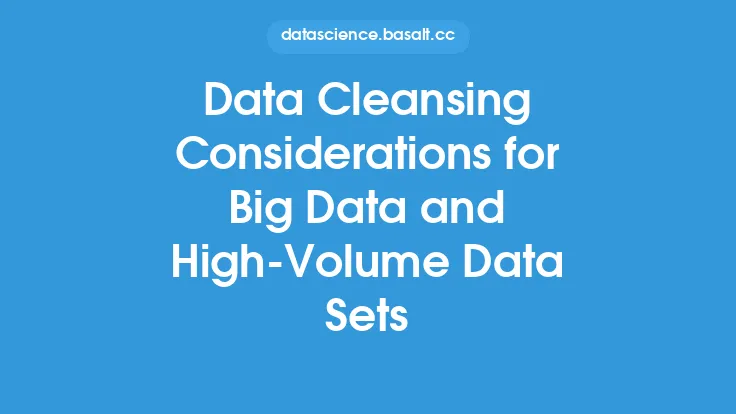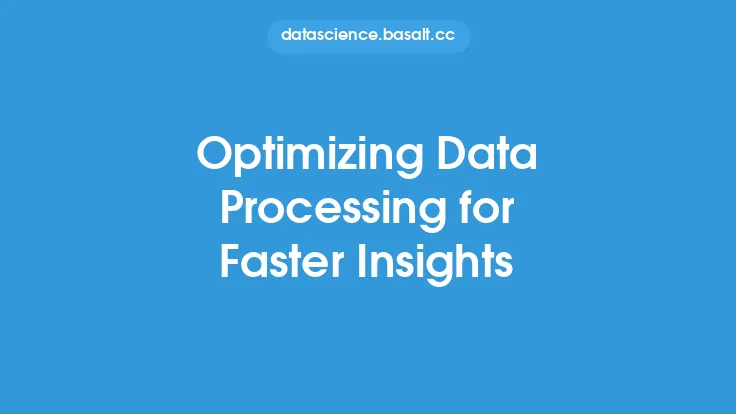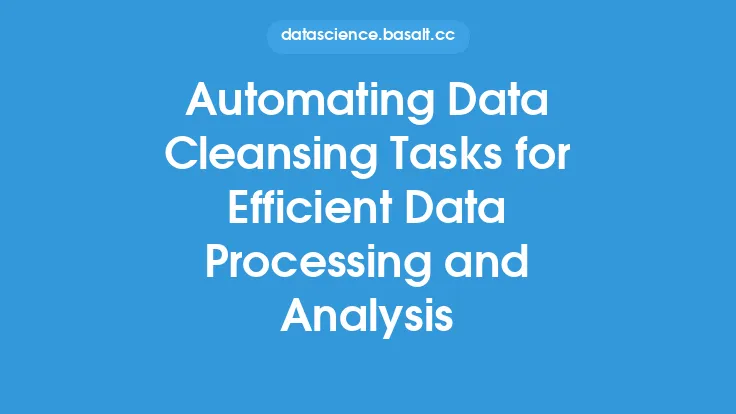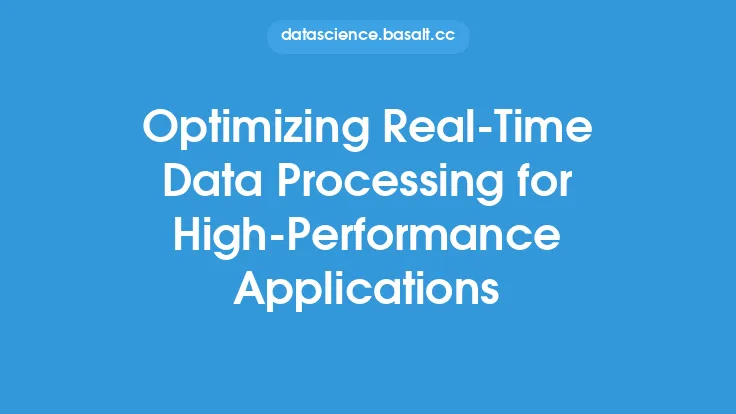The ability to process large-scale data sets efficiently is crucial in today's data-driven world. With the exponential growth of data, organizations are faced with the challenge of handling vast amounts of information, extracting insights, and making informed decisions. Efficient data processing is essential to unlock the value of large-scale data sets, and it requires a combination of advanced technologies, sophisticated algorithms, and optimized techniques.
Introduction to Distributed Computing
Distributed computing is a key concept in efficient data processing for large-scale data sets. It involves breaking down complex tasks into smaller, independent tasks that can be executed concurrently across multiple machines or nodes. This approach enables organizations to scale their processing capabilities horizontally, handling massive amounts of data and reducing processing times. Distributed computing frameworks, such as Apache Hadoop and Apache Spark, provide a foundation for building scalable and efficient data processing pipelines.
Data Processing Architectures
A well-designed data processing architecture is critical for efficient data processing. There are several architectures to choose from, including batch processing, stream processing, and lambda architecture. Batch processing involves processing large datasets in batches, often using distributed computing frameworks. Stream processing, on the other hand, involves processing data in real-time, as it flows into the system. Lambda architecture combines batch and stream processing, providing a hybrid approach that offers both flexibility and scalability. The choice of architecture depends on the specific use case, data characteristics, and performance requirements.
Data Storage and Management
Efficient data storage and management are essential for large-scale data processing. Traditional relational databases are often insufficient for handling massive amounts of data, and alternative storage solutions, such as NoSQL databases and data warehouses, are gaining popularity. NoSQL databases, like Apache Cassandra and MongoDB, offer flexible schema designs and high scalability, while data warehouses, like Amazon Redshift and Google BigQuery, provide optimized storage and querying capabilities for analytical workloads. Additionally, data lakes, which store raw, unprocessed data, are becoming increasingly popular for their ability to handle diverse data formats and provide a centralized repository for data.
Data Processing Algorithms and Techniques
A range of data processing algorithms and techniques are available for efficient data processing, including data aggregation, data filtering, and data transformation. Data aggregation involves combining data from multiple sources, while data filtering involves selecting specific data subsets for processing. Data transformation involves converting data from one format to another, often using data mapping and data validation techniques. Advanced algorithms, such as machine learning and deep learning, can also be applied to large-scale data sets, enabling organizations to extract insights and build predictive models.
Parallel Processing and Concurrency
Parallel processing and concurrency are essential for efficient data processing, enabling organizations to take advantage of multi-core processors and distributed computing environments. Parallel processing involves executing multiple tasks simultaneously, while concurrency involves executing multiple tasks in overlapping time periods. Techniques like data partitioning, pipelining, and parallel sorting can be used to optimize parallel processing and concurrency, reducing processing times and improving overall system performance.
Data Quality and Validation
Data quality and validation are critical aspects of efficient data processing, ensuring that data is accurate, complete, and consistent. Data quality involves assessing data against a set of predefined criteria, while data validation involves checking data against a set of rules and constraints. Data profiling, data cleansing, and data normalization are essential techniques for ensuring data quality, while data validation frameworks, like Apache Beam and Apache Spark, provide a structured approach to data validation.
Scalability and Performance Optimization
Scalability and performance optimization are essential for efficient data processing, enabling organizations to handle increasing data volumes and velocities. Scalability involves designing systems that can handle growing workloads, while performance optimization involves tuning systems for maximum performance. Techniques like load balancing, caching, and indexing can be used to optimize system performance, while scalability frameworks, like Apache Kafka and Apache Storm, provide a foundation for building scalable data processing pipelines.
Security and Governance
Security and governance are critical aspects of efficient data processing, ensuring that data is protected and managed in accordance with organizational policies and regulatory requirements. Data encryption, access control, and authentication are essential security measures, while data governance involves establishing policies and procedures for data management. Data governance frameworks, like COBIT and ITIL, provide a structured approach to data governance, enabling organizations to manage data effectively and ensure compliance with regulatory requirements.
Future Directions and Emerging Trends
The field of efficient data processing is constantly evolving, with emerging trends and technologies offering new opportunities for innovation and improvement. Cloud computing, edge computing, and serverless computing are gaining popularity, enabling organizations to build scalable and efficient data processing pipelines in the cloud. Additionally, advances in artificial intelligence, machine learning, and deep learning are enabling organizations to extract insights from large-scale data sets, build predictive models, and drive business decision-making. As data volumes and velocities continue to grow, efficient data processing will remain a critical aspect of data engineering, enabling organizations to unlock the value of their data and drive business success.





